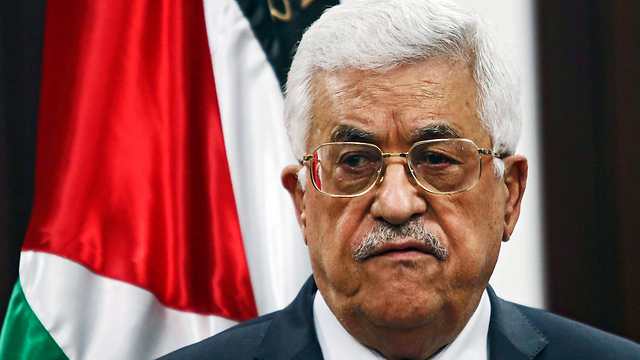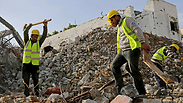
Preventing another Gaza war through 'Palestinian relief'
Analysis: Netanyahu and Ya'alon don't want to negotiate with Hamas, but are working through backdoor channels to prevent next conflict with a push to rebuild Gaza, including a port, solar farms, and joint industrial zones. There's even a Qatari envoy waiting with a billion dollars in his pocket.
It's doubtful that Brig.-Gen. Yossi Ashkenazi ever thought he would stand at the center of the peace process with Palestinians. Ashkenazi, a distinguished officer in the navy, will soon be appointed chief of naval equipment. His name came up in connection with the secret talks with Hamas – direct and indirect – because of a paper he recently prepared as a student of the National Defense College titled "A humanitarian naval corridor."
This was a technical, unclassified paper examining alternatives to creating a naval port to service the Gaza Strip. In ordinary times, it would have been buried in the IDF's libraries, like hundreds of other papers written by students of the NDC. But Ashkenazi was lucky, and his paper was published at the perfect time for the military top brass, which is searching for any way to block the tsunami that keeps rising above the Gaza Strip. Army heads are unofficially treating this paper as a framework in meetings with the political echelon.
Ashkenazi's paper considers four alternatives to the creation of a naval port. The first is establishing an independent pier for Gaza at Ashdod's port. The second is the establishment of a port in Arish in Egypt's Sinai to serve Gaza. The third is establishing a port in Cyprus or Greece. And the fourth is establishing a floating deep-water pier a few kilometers off the coast of Gaza, or an artificial island with a land bridge to Gaza. Each proposal is accompanied by an explanation of its advantages, disadvantages and chances of being implemented.
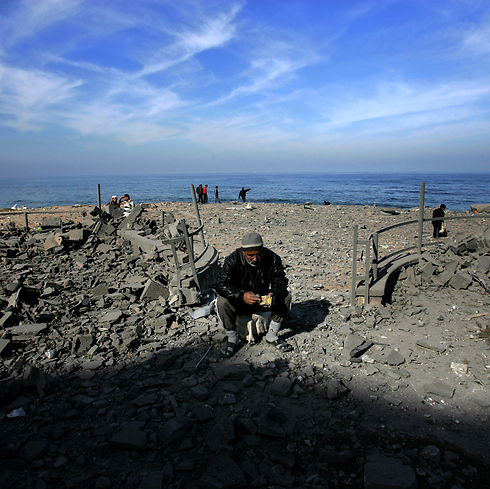
The Egyptian option was already considered by the Defense Ministry and the Coordinator of Government Activities in the Territories (COGAT) and is off the table. The Egyptians will not provide Israel with any leverage that will help it remove the Gaza Strip from its responsibilities. Israel's preferred option is Ashdod. It solves many of the problems of security checks and is more economically efficient than the others. Only Hamas is against it.
Senior navy officials do not look kindly upon the Greece/Cyprus solution, because of the inability to optimally secure the maritime corridor to the Strip. It's impossible to conduct complete checks and monitoring of thousands of containers a day in Cyprus or Greece. Every container is like a large truck, and even the smallest ship carries at least 500 containers, while a medium ship carries 3,000 containers and a large ship can hold 7,000-plus containers.
It would be impossible to check them on a sample basis, and they would need to be opened and thoroughly checked, requiring not only screening machines, but also manpower – and a lot of it. It will also be necessary to monitor and track these containers when they make their way to Gaza. Senior naval officials estimate that it would be possible to handle perhaps a few hundred containers a day, but not thousands.
Establishing a floating pier or artificial island is the preferred solution among Gazans, but construction could take a long time. It's possible to establish a pier at a distance of two kilometers from the Gaza shore, where the depth of the water reaches 16-20 meters. At this depth, ships carrying 7,000-10,000 containers each could anchor, but monitoring every single container would make the humanitarian corridor a nightmare and a point of friction. Thus, this solution can only be a complementary step to establishing a Palestinian port in Cyprus or Greece.
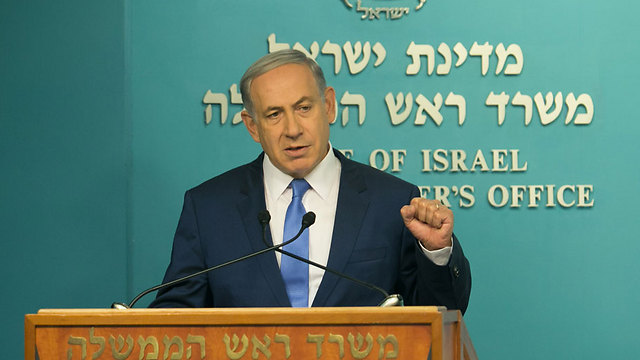
In discussions between defense officials, navy chief Major General Ram Rothberg said explicitly that if the political echelon ordered implementation of one of the solutions, the navy will be able to do so. In other words, establishing a Palestinian port outside the Gaza Strip is possible and will not hurt Israel's security interests.
Ashkenazi's paper is a buoy discharged from the submarine called "the accomplishments of Operation Protective Edge," and threatens to sink to the depths of its inhabitants. The defense establishment also understands that the conditions leading to the conflagration with Hamas a year ago still exist today. Hamas' last chance to leverage a diplomatic and economic accomplishment, as it sees Protective Edge as a military accomplishment, has been erased.
This week the leaders of Hamas admitted for the first time that Tony Blair's initiative exists no longer. That initiative permitted Hamas to sell to its public the illusion that it's possible to reach an agreement with Israel for a 15-year ceasefire in exchange for removal of the blockage and rebuilding of the Strip. It's now becoming clear that the entire initiative was very wobbly.
At the end of a discussion two weeks ago about the Blair initiative, Prime Minister Benjamin Netanyahu decided that dealing with it could seriously damage Israel, as it could push Mahmoud Abbas to resign, who sees the initiative as a betrayal on the Palestinian question. Netanyahu even made it clear that any indirect or direct negotiations with Hamas provide legitimacy for Europeans to recognize the organization.
It turns out that the Egyptians placed enormous pressure on Israel to stop this ping-pong game with Blair. Netanyahu's message reached the Egyptians, and from there reached Hamas in Gaza. At this point the Palestinians realized the entire Blair initiative was a bluff, and that Israel does not see him as a mediator at all. This didn't stop Blair from leveraging his meetings with people like Khaled Mashal in a display of public relations.
Of course, the political echelon in Israel – the prime minister and defense minister – could not have ignored our great friend Tony Blair, even though he had already left his role as a representative of the Quartet. But professional bodies in the defense establishment did everything to evade meetings with him. Blair has been seen for along time as someone who is around mainly to look after his own interests. The British press has written more than once about his supposed involvement in deals with Arab tycoons and with Arab nations. He is suspected of exploiting his ties to people in Israel in order to advance his economic interests in matters that don't necessarily match Israeli interests.
Three weeks after Operation Protective Edge, Hamas already began to send representatives to Israel bearing a consistent message about a possible agreement for a long-term ceasefire. The conditions they posed were unacceptable to Israel: Removal of the blockage, establishment of a naval port and airport, freedom of movement, cessation of Israeli Air Force flights in Gazan skies, and removal of restrictions on fishing, exports, and imports.
Among these representatives were Gazan businesspeople and foreigners visiting the Strip, who made their way to COGAT; to Amos Gilad, the director of the Political-Military Affairs Bureau in the Defense Ministry; to the defense minister; and to the Prime Minister's Office. Israel heard about it and made no reply. Tony Blair entered into this vacuum. Hamas believed that even if Israel stayed silent, it could not ignore Blair.
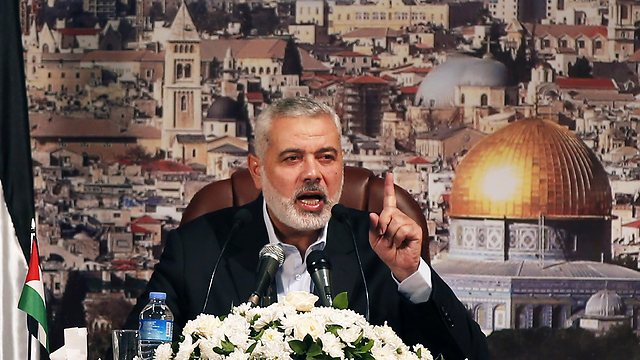
Hamas's political elite which hid behind Blair, silenced its military branch and sold illusions to the Palestinian public. The disillusionment from this initiative could bring Gaza's streets – entering the second winter after the war in almost the same condition as at its end – to the verge of eruption.
According to Israeli assessments, Hamas is still not militarily ready to renew the conflict. The Shin Bet has defined smuggling into Gaza as a central issue to be handled in cooperation with Egypt, and the results in the field are noticeable. Hamas succeeded in replenishing only 15-20 percent of the rockets it fired or lost in Operation Protective Edge, and even these were self-produced.
The Egyptians are creating large fishing ponds along the length of the Philadelphi Route (on the Gaza-Egypt border), detaining members of Hamas' military branch upon their departure from Gaza, and striking at the organization's weapon caches in the Sinai. Hamas is also far from attaining the goals it set for itself on the issue of tunnels. But all this will not prevent the military clash whose goal is to break the stalemate.
The political Hamas today stands with its head bowed before the military branch, after losing all of its strategic anchors. Egypt, Turkey, Iran, Syria, Saudi Arabia, and the Gulf principalities have turned their backs to it, or are too far away to help. It has attempted to open doors using Abbas, but the Palestinian president placed conditions that Hamas could not have accepted. It attempted to leverage accomplishments through Israel, using mediators, but failed.
The Israeli military establishment is trying to enter this niche, in an attempt to postpone the next confrontation for as long as possible. These are preliminary plans and steps winning, for now, the defense minister's quiet approval. The larger moves still don't have approval from the political echelon.
The Coordinator of Government Activities in the Territories, Maj. Gen. Yoav Mordechai, has prepared a plan to deal with the crisis in the Gaza Strip. Meanwhile, a plan was prepared to change the approach to the Palestinian Authority and West Bank residents, as, according to the views of the Chief of Staff and the professionals in the defense establishment, the plan in Gaza has no chance of being implemented without cooperation with Abbas and Egyptian support.
The Gaza plan has already begun to be tried out on the ground.
The first phase is a dramatic improvement in energy infrastructure and an increase in the amount of electricity and gas entering Gaza. According to the plan, Israel will add power lines in Gaza, help establish many acres of solar farms in the northern Gaza Strip, which will supply another 30 mega-watts of electricity, and will allow Gaza to be connected to Israel's natural gas field.
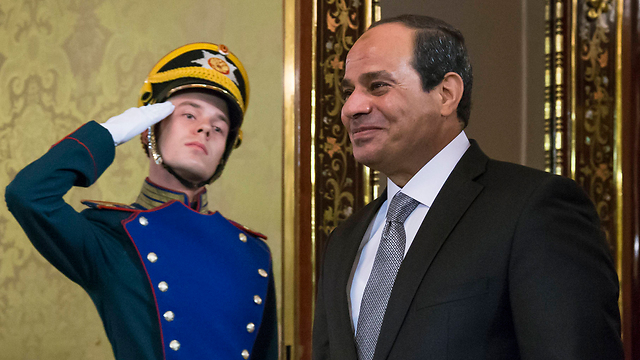
In the second phase, sewage treatment plans will be built, preventing 100,000 liters of sewage to flow into the sea every day, and water desalination plants. Israel has already double the amount of water sent to Gaza, but it's necessary to build at least two large desalination plants. Such facilities would require amounts of energy that Gaza residents, who today receive electricity for six to nine hours a day, can only dream about.
The third phase is opening exports from Gaza to the Arab world and Israel, creating industrial areas adjacent to the border fence and building Israeli-owned factories inside the Gaza Strip. And there are also plans to renew passing of goods through Karni Crossing.
Israel today permits the entry of 1,500 Gazan residents and foreigners through Erez Crossing every day. On weekends, it permits the entry of a few hundred Gazans for prayers at the Temple Mount. Screening of trucks at Kerem Shalom border crossing, thanks to new Dutch equipment, allows the entry of 700 trucks a day. Israel also permits the import of new cars and vans to Gaza through Ashdod's port. This is still only a drop in the water.
Israel is attempting to release pressure in places where it doesn't clash with official policy, which states that there is no dialogue with Hamas. Defense Minister Moshe Ya'alon said this week at a convention for Calcalist newspaper, "There will be no agreements with Hamas. Reality will be decided on the basis of interests and not on the basis of paperwork."
Rebuilding the damaged Gaza Strip is also occurring slowly. Out of thousands of destroyed apartments, reconstruction has begun on just 660. The money from donor countries isn’t flowing in. Citizens who received building materials for their homes sold them on the black market for four times their value to make a living. Instead of cement and glass, they‘re covering the holes in their walls with plastic sheets.
This is where the issue of a port comes in, as it could jumpstart rebuilding and relieve the sense of besiegement. Money for the project is already there: A special Qatari envoy, Mohammed al-Emadi, is sitting on over a billion dollars, just waiting for Israel's ok to release the funds. This is one of the funding sources for blockade easing plan, which will make clear to Gazans what they could lose by breaking the rules.
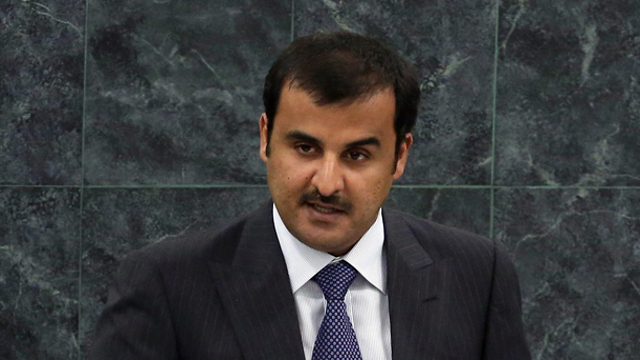
The Erekat three
In the west bank, the plan is still in the IDF’s contemplative stage. It assumes that what’s called “Palestinian relief” doesn’t work anymore. The Palestinian of 2015 isn’t like the older models. He knows his rights, he knows the international community, he knows about Israel’s weaknesses, and he plays his legal cards well, including the diplomatic intifada he’s successfully fighting internationally. We can’t give beads to the natives and buy time by removing a roadblock here and there anymore. We have to think and conduct ourselves differently.
The plan is intended to give the West Bank’s Palestinian residents their freedom of movement back, as well as their political and economic freedoms. It includes elements such as constructing large industrial and free zones in C areas, which are in Israel’s complete control. The construction of such a zone in Jenin is being discussed already.
The plan is also intended to expand the authority of Palestinian security forces. For instance, allowing them to build police stations in B areas, which are in Israel’s military control. But as soon as the Israeli government will have to make a decision, the plan is expected to run into the iron wall of the settler lobby, which sees Palestinian relief as a security threat.
And, like Hamas in Gaza, the Palestinian Authority and its head are signaling that the moment of truth is nearing. Mahmoud Abbas is doing so by once again expressing his intent to resign. Discussions of the “day after” were held this week in both the Shin-Bet and IDF Intelligence Directorate offices. The assumption is the Abbas won’t get up and leave tomorrow morning. If he does, it’s estimated that he’ll be replaced by a triumvirate of people Israel can live with.
For instance, there have been rumblings of Saeb Erekat, Majid Faraj (former head of Palestinian general intelligence), and former Palestinian Prime Minister Salam Fayyad. However, it could end up being a totally different crew that fails to keep things under control.
Israel’s intelligence bodies have created a type of “telling signs” check list, which should predict if Abbas really intends to retire: His health, whether he’s marked someone to inherit him, whether he’s written a diplomatic will, whether he’s closing down his businesses, and other signs that aren’t apparent right now. If Abbas doesn’t go by the signs and quits anyway, it wouldn’t be the first time Israel didn’t see what went on right under our nose.










